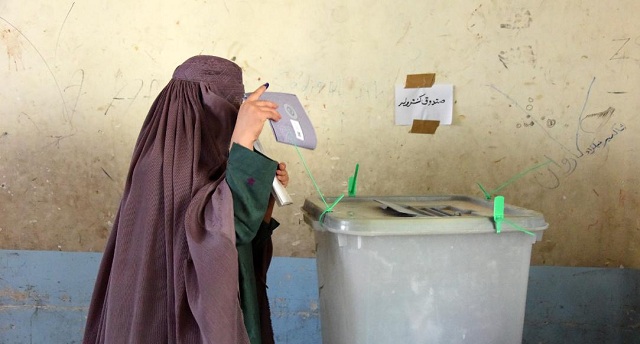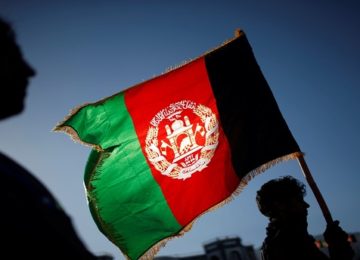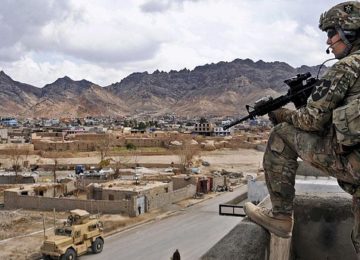The people of Kandahar cast their vote on 27 October 2018, a week later than the rest of the country. Although no figures have been released, turnout appears to have been good in Kandahar city and Spin Boldak, as was expected, and patchy to nonexistent in most other districts. The IEC had stressed that the bad experience of the first two days of the election would not be repeated in Kandahar. Still, the vote was marred by late starts and technical problems, which the IEC is trying to underplay. AAN’s Ali Mohammad Sabawoon takes a closer look (with input from Martine van Bijlert).
Security, voting and turnout
The people of Kandahar went to cast their vote on 27 October 2018, a week later than the rest of the country. (1) The day before the election, Abdul Badi Sayad, the Head of the IEC announced they intended to open 172 polling centres across the province with a total of 1112 polling stations. Sayad said possibly “some 12 polling centres may remain closed because of security reasons.” He also said there would be no vote in Maruf and Nesh due to insecurity, since there had been no registration in those districts. (2)
On election day security was tight. Security officials had announced a transport ban, starting the day before the election at 2:00 pm. Movement by vehicle in Kandahar city was forbidden, unless permission had been granted. (Every candidate was given permission for the use of two vehicles; observers and reporters were also allowed to move in the city to visit polling centres and cover the election). Abdul Hanan Munib, the acting governor of Kandahar, told the media in the morning that the government would provide voters the facilities of mili buses (government local buses) in the city. He also said that the health department of Kandahar had prepared ambulances in case something happened or civilians faced health problems. AAN asked three voters if they had seen any buses in action. Two of them said they had indeed seen some buses moving in the city but that they had not been enough to tackle the problems of voters in term of transportation.
The turnout in Kandahar city and Spin Boldak district – the home area of assassinated General Razeq –, according to observers, appeared to be good, with women coming out to vote as well. Kandahar city and Spin Boldak were also where, by far, the most voters had registered (see this AAN dispatch for details). Turnout was less in the nearby districts and negligible in the more remote and insecure districts.
According to Ataullah Wisa, a civil society activist, there had been no voting at all in Reg and Shurabak districts; “Not a single person voted,” he said (which should not come as a surprise, given that these districts registered respectively only 161 and 203 voters). He thought there had been some voting in Khakrez, but not in all centres (Khakrez actually had only two polling centres with a voter registration of 409, 32 of which were women). He thought the overall turnout had been good and corruption less than in previous elections, because of the use of biometric checks – based on contacts with observers and what he had seen on social media. He hoped this would lead to a change in the province’s representation. “Thank God,” he said, “it seems that the old members of the Wolesi Jirga did not receive enough votes to return to the parliament.”
Residents in Ghorak district said the security forces were the only ones to cast their votes in that district. Juma Khan, a resident of the Ghorak, told AAN that two IEC teams had gone to Kikak village where the security forces were based (Kikak is also where Ghorak’s district centre was shifted to, in summer 2018). He said “There were no observers in this centre. The security forces voted, but no civilians cast their vote.” According to him, 570 security forces had registered there during registration process, but he did not know how many cast their votes. He said the civilians even hadn’t registered.
Ghausuddin Frotan, a local journalist and observer, told AAN that turnout appeared to be low even close to Kandahar city. By 10:30 on election day he had seen only two voters cast their votes in the polling centre of Mirwais Mena. Mirwais Mena is around five kilometres from Kandahar city.
A repeat of the first two election days: late starts and technical problems
Like in the rest of the country (see earlier AAN reports here and here), Kandahar’s vote was marred by technical and logistical problem, despite assurances by the head of the IEC that the bad experience from 20 October would not be repeated here. According to the IEC, they had provided additional training and had created reserve voters lists as well as backup biometric systems, so that whenever a problem occurred they would be able to quickly address it.
Still there were many complaints: many polling centres did not open on time; voter lists were missing, wrong or incomplete; and there were still problems with the biometric system.
An observer from Kandahar told AAN that polling centres in Kandahar city, Panjwai, Zharai and Arghandab, and Kuchis centres in Spin Boldak districts did not start their work on time – either because of the late arrival of the staff or their unfamiliarity with the biometric system. As a result, the polling centres opened at 9:00 am, 10:00 am, sometimes not until noon. This occurred for instance in Aino Mena’s Sayed Jamaluddin Afghan polling centre, Malalai high school and in Shah Bazar Jama polling centre. Once the centres were open, there were still problems with the voter lists and many people were unable to find their names. In some cases, the lists of one centre had gone to the other and the other to the next, which meant that in those centres nobody could find their names in the list.
Large crowds of people gathered in front of Sayed Jamaluddin Afghan polling centre in Aino Mena, where voting started two hours late. Muhammad Salim, a voter, later told AAN that in this centre the problem had been the biometric system. He said that many of the employees were not familiar with it and many people had been unable to find their names in the voter lists. A journalist who did not want his name to be mentioned gave AAN a different explanation: “The biometric system of Sayed Jamaluddin Afghan polling centre was forcefully taken away by a candidate and then at 11:00 am it was brought back to the polling centre.”
The polling centre in Safiya Ama Jan girls’ high school, nearby, only opened at 11:00 am. Observers said that the ballot papers reached the centre late. Shafia, a voter, told AAN at noon, that she had come at 7:00 am and was still waiting to vote, five hours later. Safiya, a woman in Nahiya three, said that in a polling centre here the biometric system had worked only until noon and after that it no longer worked. “After that,” she said, “the voters were allowed to vote without biometrics.”
In other places it had been possible to vote without biometrics or voter lists, even earlier. A man who was speaking to Radio Liberty’s Pashto service from Kandahar Aino Mena, nearly two hours after the election began said that although he had registered himself in Nahiya two, he now lives in Aino Mena. He said he tried to go to the place where he registered, but because of the ban on transportation he couldn’t. Because he knew someone among the employees of the commission in Aino Mena, they had helped him cast his vote without checking his name in the list. He said he was the first among all those waiting to vote.
In the centre of Mahmud Tarzi high school in Kandahar city, ballot papers ran out and the biometric system was out of order. In Zaher Shahi high school many people could not find their names on the list; many went home without casting their votes. In Shahid Azimullah school, the women polling stations opened very late and the women faced many problems waiting in line. Once it was their turn, many could not find their names on the list. In Malalai high school, in Nahiya one of the city, only one of the three women polling centres was active and had a functioning biometric system. The employees of the remaining two centres were sitting doing nothing, as well as the observers.
In some places, particularly in the districts, staff did not turn up at all. In Moshan village, Panjwai district, for instance, only 12 out of the 20 IEC employees turned up. After a long wait, many people went home without casting their votes.
Missing materials in Kuchi centres
Frotan, the journalist and observer wrote in his face book page at 11:30 on election day, that tens of people were waiting to cast their votes in Ghazi Amanullah Khan polling centre of Kokran area, in an outskirt of Kandahar city. He said the centre was still closed because voting materials had not arrived. This was a separate Kuchi centre. Many people had come to the centre early in the morning and had waited for hours. He later said the centre opened very late in the afternoon.
There were also reports from Spin Boldak in the morning that Kuchis were waiting in front of their polling stations, but that there were no materials. AAN talked to Kandahar’s provincial IEC head, doctor Nematullah Wardak, on election day just before noon. He confirmed that the materials for Kuchis in Spin Boldak had not been sent, but said they were working on it. Wardak later told AAN that they had sent materials in the afternoon. Spin Boldak is nearly one and half hour drive from Kandahar city.
There were also reports of Kuchis being deprived from casting their votes in the Haji Aziz area of Nahiya five of Kandahar city. Muhammad Abdullah, a Kuchi elder, told AAN on 30 October that the Kuchis had a very good in turnout here, but that “the ballot papers finished in the afternoon and many Kuchis could not cast their votes.” He said that in their area there was only one polling station. (There seem to be two possible explanations here. Either the IEC mistakenly sent fewer ballots than had registered as voters, or more people tried to vote than had originally been registered.)
A journalist in Kandahar city who did not want to be named told AAN that he thought the late opening of polling stations for Kuchis in Spin Boldak, Zhari and Kokaran had been a planned issue, so that a particular candidate could receive – presumably fraudulent – votes and that this candidate was supported by the police in those stations.
Voter influencing
There were also reports of (attempted) voter influencing. For instance Abdul Sabor, a resident of Kandahar city, told AAN that on election day he saw a large candidate photo stuck on a vehicle, close to the polling station, which is contrary to the election law. According to reports from a women polling centre in Sufi Baba in Chawnai area of Kandahar, a woman candidate was telling voters to cast their votes in her favour and was telling election employees to let her voters vote without a thorough check of the registration stickers and lists. According to a complaint from Zhari district, a journalist in Kandahar told AAN, in a Kuchi polling centre the voters were not allowed to cast their votes, unless they voted for a particular candidate. The observer said this took place with the help of the police and the observers who were present.
Muhammad Yar Yar, a famous poet and politician in Kandahar, wrote on his Facebook page “In Abdul Hadi Dawi polling centre of Dand district, the head of police district and the police on duty were forcing people to vote for [three specific candidates]. They did not let the observers of other candidates observe the process. They broke the mobiles of observers and tore their documents.”
Reports of fraud
There were indications of fraud in the election as well. Nematullah Wardak from the IEC said they had received reports of ballot stuffing in Panjwai district, which they were investigating. Abdul Wodud Tarah, a commissioner in Kandahar’s Election Complaint Commission office told AAN on 30 October, that more than 100 employees of the Complaints Commission, in different places, had been forced to leave the polling centres where they were stationed by powerful candidates and had not been allowed to observe the process.” He further said there were reports that some candidates had ballot stuffing done in their favour during the night before the election. He also said that in Spin Boldak a son of a candidate had told the voters they would not be allowed to vote, unless they cast their vote in favour of his father. “Nearly 300 voters went back home without casting their votes,” Tarah said.
Responses by the IEC and ECC
Nematullah Wardak, head of Kandahar election commission, admitted in a press conference just after the election that there had been some “technical problems in the beginning.” He said this had caused “ten per cent of the polling centres” to open late. He also admitted that dozens of election commission employees had not shown up because of security threats and that this had caused polling centres to open late. Wardak also accepted that in some places there had been a shortage of ballots papers and the commission had not transferred all ballots to the centers, but he said they had been able to cover it during the day.
On 30 October Wardak told AAN that “according to the information we have received by phone from all over the province, a total of around 230,000 people voted in Kandahar province.” This represents a little over 40 per cent of the number of registered voters. He said that according to his information all polling centres had been open, although in some cases, he said, “one or two polling stations [in a centre] may have remained closed, either because of technical problem or the low number of voters.”
Some observers, however, estimated that as many as 200 employees of the election commission may have been absent on the day of election. They thought that probably in particular some women staff had not been allowed to go to work by their husbands or family members, because they thought that after the assassination of General Razeq the security situation may get worse.
Karimullah Stanakzai, the head of the Electoral Complaint Commission (ECC) said in the same press conference that they had received around 350 complaints from Kandahar province on its election day. Twelve had been officially submitted and the rest came in by phone. He said the complaints included the late opening of polling centres, nonexistence of voter’s names in the lists, technical problem with the usage of the biometric system or the absence of the biometric system and the influencing of voters. He said that, those complaints would be investigated in 15 days. Abdul Wodood Tarah, a commissioner in Kandahar’s Election Complaint Commission office told AAN on 30 October, that by that time “around 200 complaints” had been officially registered with the commission (so not counting the complaints that had only come in by phone.
The Kandahar IEC’s Wardak told AAN on 30 October that the ballots had reached Kandahar city from all districts, but had not yet been officially handed over to the commission. The ballots were transferred from five districts – Ghorak, Mianeshin, Reg, Khakrez and Shorabak – by air.” Wardak said that turnout had been highest in Kandahar city and Spin Boldak district (which was to be expected, given the registration figures), but that he did not know what other districts had seen significant turnout.
Looking ahead
In the coming weeks, the IEC will be counting Kandahar’s vote and entering the numbers into the database. It will also be deciding what to do with the votes that were cast without voter lists or biometric verification. If the rules are applied strictly, this may become tumultuous. People who have stood in line for hours might see their votes invalidated because of logistical problems, hardware failure or because IEC staff didn’t properly follow the procedures. Candidates are likely to clamour in an effort to get boxes that hold their votes accepted. If the rules are not applied strictly, the IEC might let through clear cases of ballot stuffing.
Edited by Martine van Bijlert
(1) The week-long delay of Kandahar’s election was in response to the assassination of General Abdul Razeq, the chief of Kandahar police and General Abdul Momin Hussainkhel, the head of national security department, two days before the country’s parliamentary election (see here).
(2) According to this list of Afghanistan’s Independent Election Commission, the IEC, 567,608 people had registered to cast their votes, 73,595 of which were women and 10,262 of which had registered for the nationwide Kuchi constituency (gender not specified). They could choose between 111 candidates (112 minus one: Nasir Mobariz who was assassinated nearly a month ago in Kandahar), 12 of which were women. The candidates were competing for 11 seats (3 of which were allocated to the women).
By Special Arrangement with AAN. Original link.
Disclaimer: Views expressed on this blog are not necessarily endorsed or supported by the Center for Research and Security Studies, Islamabad.








